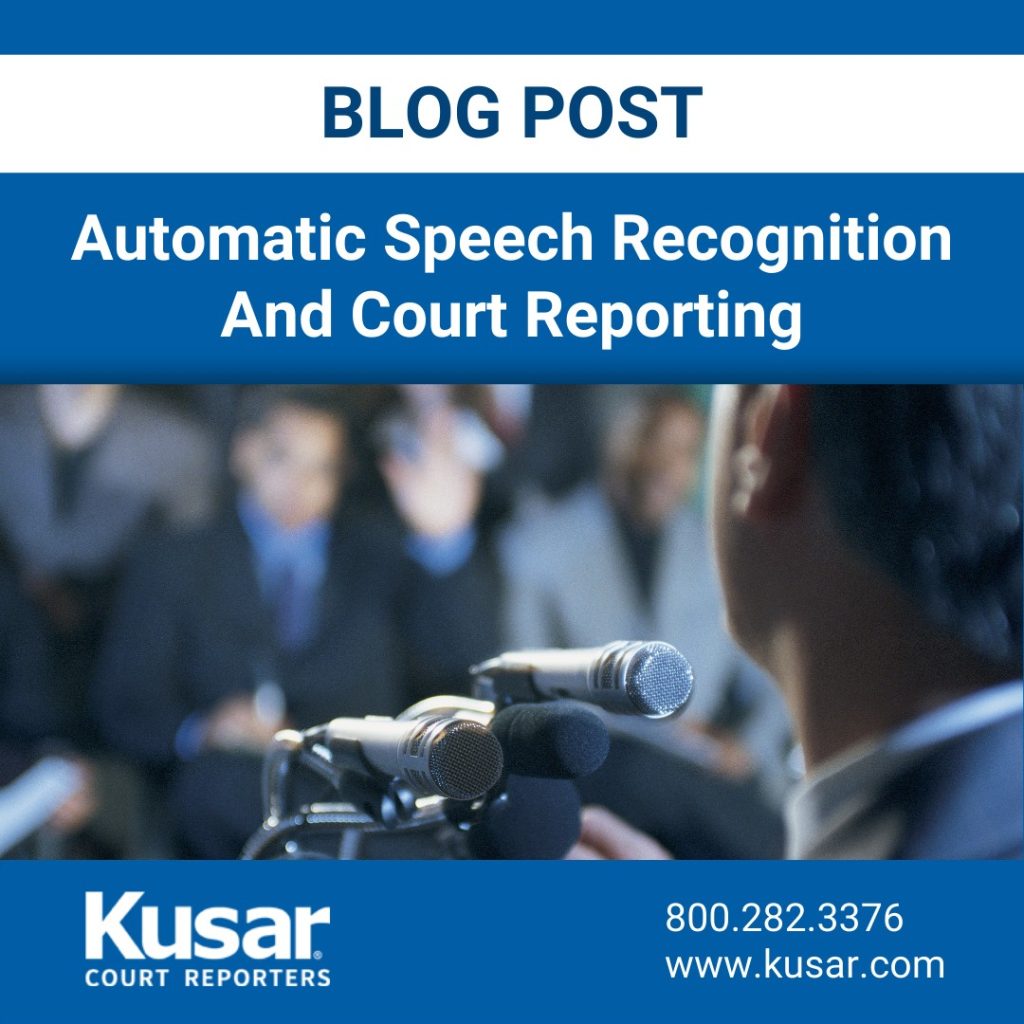
Automatic Speech Recognition and Court Reporting
Automatic speech recognition is a continuously evolving technology that expands many industries. It allows people to review what people have said in a text format. But is it accurate? When the stakes of using this technology could have such high stakes, such as potentially finding a person guilty of a crime or influencing a high-value civil case, should automatic speech recognition and court reporting go hand in hand? An experienced court reporter can explain the differences in the services they provide versus the often-limited services of companies that rely exclusively on technology. If you are in need of professional, certified court reporters, consider contacting Kusar Court Reporters by calling (800) 282-3376.
What Is Automatic Speech Recognition?
Automatic speech recognition uses machine learning or artificial intelligence to process human speech into readable text. It is the same technology that allows for captions to appear alongside videos or television programs and speech-to-text when using a mobile phone.
Can Voice Recognition Be Used in Court?
Existing state court rules do not address whether voice recognition can be used in court instead of having an authorized person or officer. The National Court Reporters Association has previously communicated a concern that there would be a shortage of human court reporters, which has led to some companies trying to fill in the gap with AI-assisted technology.
For federal cases, Federal Rule of Civil Procedure 80 requires that admissible testimony be proven by a transcript that the recorder certifies as accurate. This gives rise to the question of whether a computer or AI could certify such a transcript. A human being may not have been physically present when the recording was made when voice recognition was used.
Verbatim Is Not Enough
Some automatic speech recognition and court reporting agencies claim that voice recognition systems provide a verbatim rendering of testimony. However, an analysis of these products often find that this claim is not accurate, and that automatic speech recognition is far from 100% accurate. Additionally, automatic speech recognition products do not have the sophistication to understand the tone, dialect, and context of language.
Problems with Automatic Speech Recognition and Court Reporting
Unfortunately, automatic speech recognition tools come with certain inherent problems, including:
Less Accuracy
According to a recent Stanford University study, automatic speech recognition was shown to be up to 35% inaccurate. Additionally, the study found that the technology was less accurate when recording the testimony of certain ethnic individuals. In contrast, the National Court Reporters Association reports that certified court reporters have 99% or greater accuracy, which is well beyond the capability of audio recordings.
Slower Process
Human court reporters use technology that captures testimony at rates of 225 words per minute or higher. This record is created contemporaneously with live testimony. If necessary, the court can ask the reporter to repeat back something that was said during the proceedings. With automatic speech recognition, the audio recording must first be transcribed by the company before it is available for review, creating a slower process than using a human court reporter.
Fewer Ethical Guidelines
Court reporters are officers of the court who are bound to ethical guidelines. They are responsible for creating an unbiased and accurate record. Court reporters must go through training and acquire the necessary education before they can work in this capacity. They must also complete ongoing educational requirements to preserve their credentials.
Confidentiality Concerns
The National Court Reporters Association’s Code of Professional Ethics requires court reporters to preserve the confidentiality of testimony they recorded. When this recording is outsourced to a company that relies on automatic speech recognition, there may be many more people who interact with the recording. Multiple people may be involved in the process of taking an audio recording and converting it to text, proofreading the document, and correcting mistakes, which may increase the possibility that more people may access confidential, financial, medical, or trade secret information contained within such transcripts.
Certification Problems
Court rules typically require that the final transcript be certified. If a machine records testimony, who can certify the transcript? Such audio recordings may not meet the court’s requirements for a certified transcript. Additionally, court reporters are able to administer an oath to witnesses, which AI systems may not be permitted to do under applicable court rules.
Security Issues
Court reporters know how to keep their transcripts and files safe. Automatic speech recognition systems may not be properly protected. Data breaches could result in the leak of confidential information. Audio recordings could also be lost or destroyed because of fire, storm, theft, or other reasons. Electronic issues can also occur and lead to the malfunctioning of equipment.
Problems with the Recording
Automatic speech recognition companies may involve limited human interaction during the recording. Instead, a human may only be involved with beginning the recording and ending it. The company may assume that the recording will accurately depict the proceeding. It may not be until later that it is discovered that there are problems with the recording. At this point, it would be too late to try to fix it. It would also be impossible to recreate the proceeding.
Problems that may occur during the recording process may include:
- Difficulty understanding a person because of an accent or soft-spoken tone
- Multiple people trying to talk at the same time
- Sounds in the courtroom or recording room that interfere with the recording
A court reporter can stop in the middle of the process to clarify or have information repeated. An audio recording does not have this capability.
Contact Kusar Court Reporters for Your Court Reporting Needs
If you would like more information about automatic speech recognition and court reporting standards, consider contacting Kusar Court Reporters. We can explain why a certified court reporter is the better option and the protections this option provides. Call us at (800) 282-3376 to inquire about our services.

